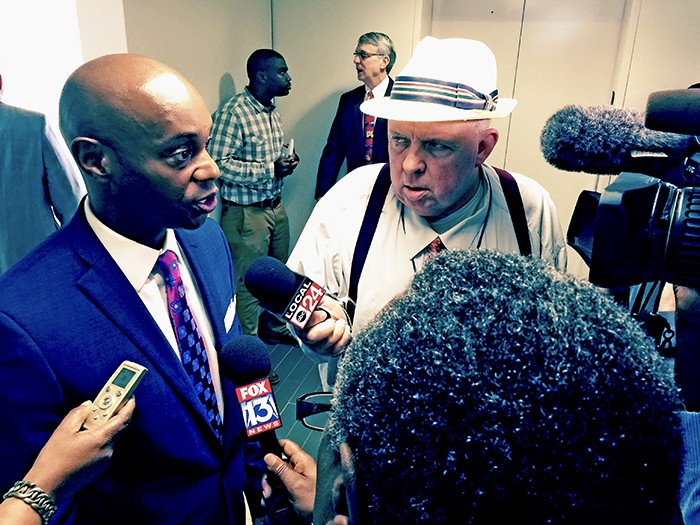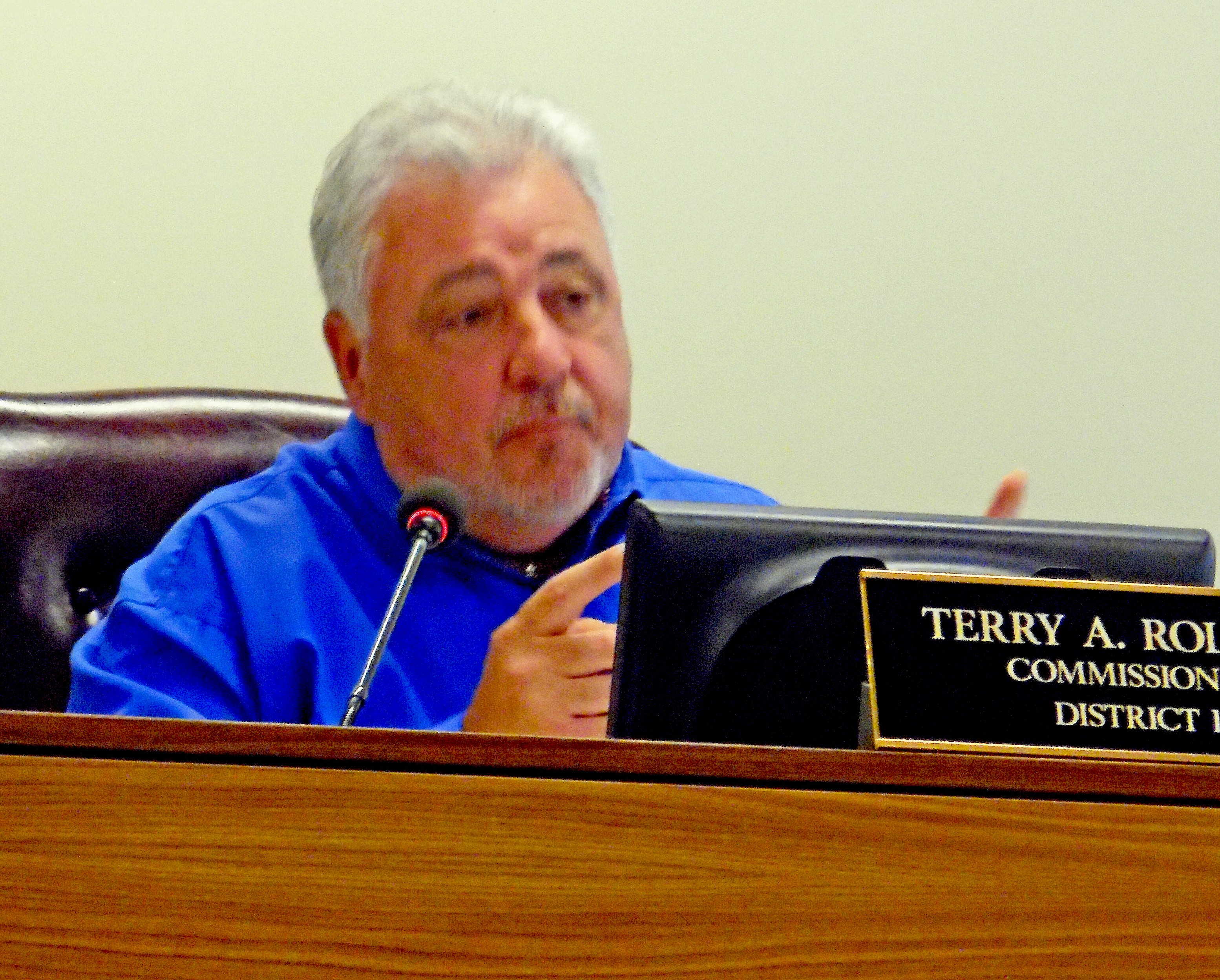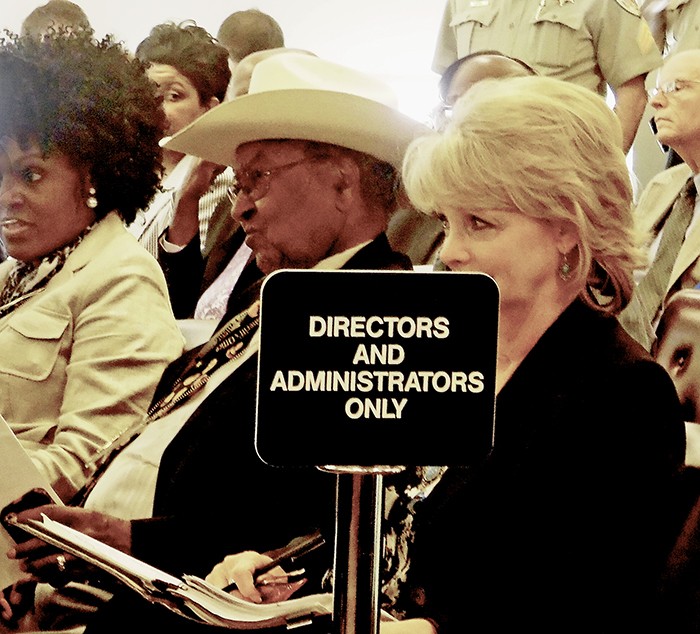Wednesday’s sessions of the Shelby coun
 JB
JB
A satisfied Superintendent Dorsey Hopson faces the press after budget hearing.
ty Commission demonstrated two facts conclusively: (1) that, when any public official begins a set of remarks with the promise ‘I’ll be brief,’ put that pillow you brought with you back of your head and settle in for a lengthy snooze; and (2) at budget time the elected guardians of the public trust can, dollar-wise, swallow a camel and choke on a gnat.
Both of these truisms refer to the same circumstance — the component of Wednesday’s Committee meeting devoted to vetting the budget requests of various agencies of county government.
The Commission took no votes as it engaged in give-and-take with representatives of the agencies (it will make decisions on the various requests at some point between now and the new fiscal year beginning July 1), but the opinions of its members were not difficult to divine.
The request of Shelby County Schools for a $14.9 budget increase was, by and large, met with perfunctory questioning of Superintendent Dorsey Hopson, who, it must be said, answered all inquiries forthcomingly and with impressive detail. So did other representatives of the county school system, including Chris Caldwell, the SCS board’s budget chair.
The members of the Commission were so clearly convinced of the merit of the SCS request — which, fairly convincingly, dealt with unavoidable challenges to the district brought about by changes not of the school administration’s making — that the dominant response from Commissioners was some variant of the “I’ll-be-brief” promise, followed by extended praise of Hopson and his team and/or solicitude for the district’s problems
(Number One of which was the conundrum of how to provide education to a largely impoverished and socially dislocated school population. As Commi
 JB
JB
Roland: Sheriff’s billeting ‘doesn’t pass the smell test.’
ssioner George Chism, a suburban Republican, noted, the typical home environment of inner-city SCS students bore little resemblance to “a household in Collierville.”)
The Commissioners as a whole were clearly impressed by Hopson and by evidence he presented of higher academic achievement on his watch, by economies effected through staff consolidations and school closures, and by the success of the SCS I-Zone program in holding its own against competition from charter schools and acquisition of school facilities by the state’s ASD program.
(Nor did it hurt that the SCS funding request was linked to an additional $5 million or so for the schools in the municipal systems created by suburban de-merger in 2014.)
In any case, the Commissioners would respond, one by one, with the aforementioned encomia to Hopson and his achievements.
Other parts of Shelby County’s public sphere did not fare so well.
Earlier, when the county’s IT staff was at the witness table, Commissioner David Reaves stirred the ashes of an old controversy regarding unity of IT services when he questioned the additional insurance expenses incurred by the insistence of Register Tom Leatherwood on maintaining an IT program separate from the county’s umbrella system. “$60,000 for no reason other than they want to be separate?”
And there were eyebrows raised by the costs incurred by the transfer of several administrative functions of Juvenile Court to the Sheriff’s Department, as well as add-on budget items submitted by both Juvenile Court and the Sheriff’s office. JB
JB
Chism is a stoic observer as the bona fides of his job is questioned.
Larry Scroggs, CAO of Juvenile Court, was pressed to explain why the court was seeking to double the number of beds, from four to eight, to accommodate juveniles housed overnight at Porter Leath for such purposes as “cooling off” in the aftermath of domestic assault incidents.
Commissioner Terry Roland and Commission budget chair Heidi Shafer wondered why the additional beds were needed in light of Scroggs’ testimony that the average number of beds used for such purposes on a per diem basis was 1.6. Scroggs would counter that the request for additional beds, which the Court had been seeking for some years, was to accommodate the high end of a fluctuating need for bedding.
Given that proposed expenses within the Sheriff’s Department were the subject of numerous potential questions from the Commissioners, the absence of Sheriff Bill Oldham — on official business in Austin, Texas, explained CAO Steve Leech — was greeted with an attitude close to disdain.
“I’m disappointed that the Sheriff did not come,” said Shafer, who said that if the Sheriff ha
d given sufficient advance notice of his likely absence, “we would have adjusted the day.” She went on: “We ae the funding body,” more important than “whatever is going on in Texas.”
Roland, who has had several brushes over the years with former Commission colleague Sidney Chism, now employed by the Sheriff’s Department, responded skeptically to Chism’s current billeting by the Department as a “media specialist,” noting that the Department’s public relations and media releases were seemingly taken care of by another employee, Chip Washington.
“It doesn’t pass the smell test,” said Roland, who has previously suggested that Chism’s employment was a quid pro quo resulting from support given by Chism, a well-known political broker, to Oldham’s election campaign in 2014.
Bu Roland professed himself even more concerned about the employment of former county Preparedness director Bob Nations by the Sheriff’s Department, noting that the additional employment would vest Nations in a dramatically higher pension category.
Shafer, who presided,, made it clear as she closed out that portion of the budget inquries that she would expect a “timely response, and timely response for us is a matter of days, not weeks,” hopefully from the “actual Sheriff, “and that the Commission would require “real numbers” regarding the “real money” involved.